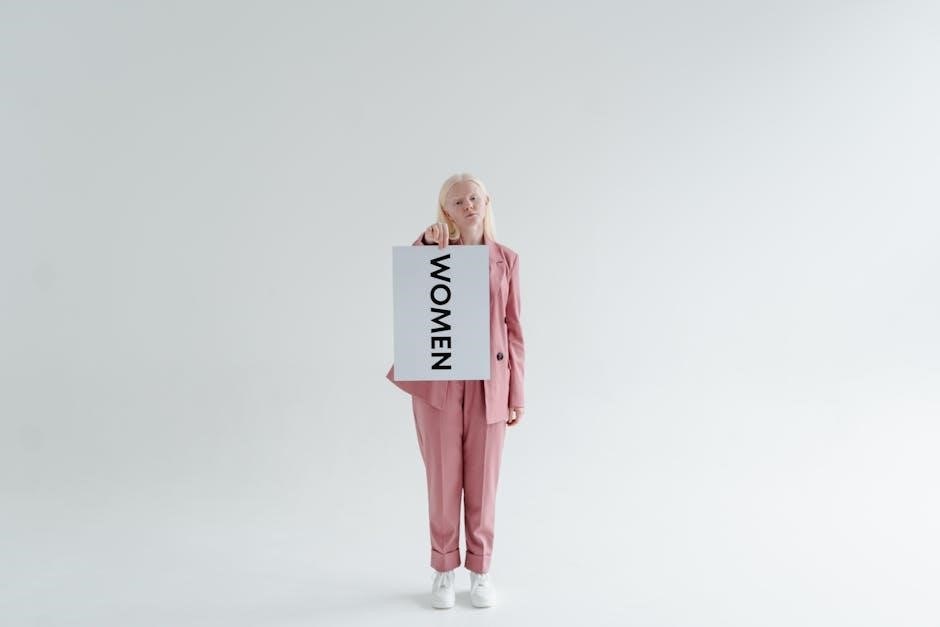Roxane Gay’s Bad Feminist is a thought-provoking essay collection that explores feminism, identity, and culture with humor and vulnerability, challenging societal expectations and fostering inclusivity.
Overview of the Book
Bad Feminist is a collection of essays by Roxane Gay, published in 2014, blending humor, personal anecdotes, and sharp cultural analysis. The book explores themes of feminism, identity, and societal expectations, challenging traditional feminist norms. Gay navigates her experiences as a woman of color, embracing contradictions and advocating for inclusivity. With its accessible tone and critical insights, Bad Feminist has become a landmark work in contemporary feminist literature, resonating widely for its fresh, unapologetic perspective.
Importance of the Topic
Bad Feminist addresses critical issues of gender, race, and identity, offering a necessary perspective on modern feminism. By challenging rigid expectations and advocating for inclusivity, Roxane Gay’s work sparks essential conversations about equality and representation. The book’s relevance lies in its ability to resonate with diverse audiences, making it a pivotal text for understanding contemporary feminist discourse and the importance of intersectional approaches to social justice.

Background of “Bad Feminist”
Roxane Gay’s Bad Feminist, published in 2014 by Harper Perennial, is a bestseller featuring essays from VQR, offering a fresh perspective on feminism and culture.
Publication Details
Bad Feminist, authored by Roxane Gay, was published on August 5, 2014, by Harper Perennial. The essay collection, which includes the titular piece originally featured in VQR in 2012, became a New York Times bestseller. The book is widely acclaimed for its insightful exploration of feminism, culture, and identity. It is available in various formats, including hardcover, paperback, and digital versions like PDF and EPUB, making it accessible to a broad audience interested in contemporary feminist discourse.
Roxane Gay’s Intentions
Roxane Gay’s intent in Bad Feminist is to redefine feminism by embracing its complexities and contradictions. She aims to challenge rigid expectations of feminist ideology, advocating for inclusivity across genders, races, and sexual orientations. Gay uses personal anecdotes, humor, and critical analysis to explore her own experiences as a woman of color, addressing societal norms and pop culture. Her goal is to create a space for diverse voices, emphasizing that feminism should be accessible and representative of all individuals, regardless of their background or identity.

Key Themes in “Bad Feminist”
The book explores feminism, identity, culture, and inclusivity, challenging rigid expectations and societal norms while advocating for a diverse and accessible understanding of feminist principles.
Feminism and Identity
Bad Feminist delves into the intersection of feminism and personal identity, exploring how societal expectations and individual experiences shape perceptions of womanhood. Roxane Gay critiques rigid feminist ideals, advocating for inclusivity and challenging the notion that feminism must conform to a single, universal standard. Through personal anecdotes and sharp analysis, she examines the complexities faced by women of color, highlighting the need for a movement that embraces diversity and rejects exclusionary norms. Her work redefines feminism as a fluid, evolving concept.
Culture and Media
Roxane Gay examines how culture and media shape societal expectations, often perpetuating harmful stereotypes. She critiques the portrayal of women and marginalized groups in pop culture, using humor and personal anecdotes to highlight these issues. Gay argues that media influences perceptions of gender, race, and sexuality, and she challenges the narratives that reinforce inequality. Her analysis of specific case studies and examples from TV, film, and literature underscores the need for more inclusive and diverse representations in media.
Essay Structure and Style
Roxane Gay’s essays blend humor with personal insights, creating an engaging and approachable style. Her critical analysis of pop culture offers sharp, relatable commentary on societal norms.
Use of Humor and Personal Anecdotes
Roxane Gay masterfully employs humor and personal stories, making complex feminist ideas accessible. Her anecdotes reveal vulnerabilities, creating a relatable voice that resonates deeply with readers, while her wit sharpens cultural critiques, rendering them both engaging and impactful. This blend of humor and vulnerability fosters a connection, allowing audiences to reflect on their own experiences and societal norms through her lens.
Critical Analysis of Pop Culture
Roxane Gay delivers a sharp critique of pop culture, examining how it shapes perceptions of gender, race, and identity. She dissects representations of women in media, highlighting contradictions and double standards. Gay’s analysis reveals how pop culture often perpetuates harmful stereotypes, yet also offers spaces for resistance and subversion. Her essays challenge readers to critically engage with the media they consume, fostering a deeper understanding of its influence on societal norms and individual identities.

Roxane Gay’s Personal Journey
Autobiographical Elements
Roxane Gay’s personal journey as a woman of color, academic, and advocate shapes her writing, blending raw honesty with intellectual rigor to challenge societal norms and expectations.
Roxane Gay weaves personal anecdotes and reflections throughout Bad Feminist, offering a candid look at her experiences with identity, body image, and feminism. Her storytelling is both vulnerable and powerful, creating a connection with readers while addressing broader societal issues. These autobiographical elements highlight her journey of self-acceptance and her evolving understanding of what it means to be a feminist in a complex world, making her narrative deeply relatable and impactful. This personal touch enriches the essays, providing a human perspective on theoretical concepts and cultural critiques.
Critique of Traditional Feminism
Roxane Gay challenges rigid feminist ideals, arguing they often fail to account for individual complexities and societal pressures, advocating instead for a more inclusive, flexible approach to feminism.
Challenging Established Norms
Roxane Gay critiques traditional feminism for its exclusivity, arguing that it often marginalizes women of color, queer individuals, and those who don’t conform to societal expectations. She contends that the movement’s rigid ideals fail to account for the complexities of individual experiences, particularly in navigating intersecting identities. Gay challenges the notion of a “perfect feminist,” emphasizing that feminism should embrace imperfections and contradictions. Her essays call for a more inclusive and adaptable movement, one that recognizes the diversity of women’s lives and challenges systemic inequalities. By questioning established norms, Gay advocates for a feminism that truly represents all women, fostering a more equitable and empathetic dialogue.
Argument for Inclusive Feminism
Roxane Gay advocates for a feminist movement that embraces diversity, challenging traditional norms and promoting equality across race, gender, and sexual orientation, fostering a more inclusive society.
Embracing Diversity
Roxane Gay emphasizes the importance of inclusivity in feminism, advocating for the representation of diverse voices and experiences. She argues that feminism should not exclude individuals based on race, gender identity, or sexual orientation. By embracing diversity, Gay believes the movement can become stronger and more equitable, addressing the unique challenges faced by different groups. This approach challenges traditional feminist narratives and promotes a broader, more inclusive definition of feminism.
Intersectionality in the Book
Roxane Gay explores intersectionality by examining how race, gender, and sexuality intersect, shaping identities and experiences. Her essays highlight the importance of recognizing these intersections in feminism.
Exploring Racial and Sexual Identities
Roxane Gay delves into the complexities of racial and sexual identities, illustrating how these intersect with feminism. She shares personal anecdotes and critiques societal norms, advocating for inclusivity and challenging stereotypes. Gay’s essays emphasize the diversity of experiences, urging readers to recognize the multifaceted nature of identity and its role in shaping feminist discourse. Her work highlights the importance of representation and voices often marginalized in mainstream narratives.

Pop Culture and Feminism
Roxane Gay critiques how pop culture shapes perceptions of gender, race, and identity, advocating for a more inclusive feminist movement that challenges societal norms and representations.
Case Studies and Examples
Roxane Gay uses specific examples from pop culture, such as The Hunger Games, to illustrate how feminist ideals are both embraced and challenged. She examines the portrayal of women in media, critiquing the narrow representations and societal expectations placed on them. Gay also discusses how women’s fiction is often marginalized, highlighting disparities in recognition. These case studies underscore her argument for a more inclusive and diverse feminist movement, emphasizing the need to challenge and redefine traditional narratives in media and society.
Reception and Cultural Impact
Bad Feminist sparked widespread acclaim, shifting conversations on feminism and identity, and solidifying Roxane Gay as a pivotal voice in contemporary discourse.
Reviews and Public Response
Roxane Gay’s Bad Feminist received widespread critical acclaim for its bold, humorous, and unapologetic exploration of feminism, identity, and culture. Reviewers praised its accessibility and honesty, with many hailing it as a pivotal work in contemporary feminist discourse. The book sparked vibrant conversations, resonating with readers who appreciated its inclusive perspective. While some critics noted its challenging themes, the collection solidified Gay’s reputation as a fearless and influential voice. Its impact continues to be felt across literary and cultural landscapes.
Legacy and Influence
Bad Feminist has become a landmark text in contemporary feminist discourse, inspiring new conversations about identity, culture, and inclusivity. Its influence continues to shape modern feminist thought and cultural critique, solidifying Roxane Gay’s reputation as a visionary writer and thinker.
Impact on Contemporary Feminism
Roxane Gay’s Bad Feminist has redefined modern feminist discourse, emphasizing inclusivity and challenging rigid definitions of feminism. Its exploration of race, gender, and culture has inspired a new wave of intersectional thinking. The book’s success as a bestseller and its adaptation into various formats have made it accessible to a broader audience, fostering conversations about identity and equality. Gay’s work has shifted the feminist movement, encouraging a more diverse and accepting dialogue, and its influence continues to shape contemporary feminist thought and activism globally.
Roxane Gay’s Bad Feminist remains a pivotal work, blending humor and insight to challenge societal norms. Its influence continues to inspire conversations about equality and representation.
Final Thoughts on the Book’s Significance
Bad Feminist is a groundbreaking work that challenges traditional feminist ideals while advocating for inclusivity. Roxane Gay’s candid essays resonate deeply, inspiring conversations about equality, representation, and personal identity. The book’s cultural relevance lies in its ability to bridge gaps between theory and lived experiences, making feminism accessible and relatable. Gay’s unapologetic voice has redefined modern feminist discourse, leaving a lasting impact on how we view gender, race, and societal expectations. Her work continues to empower and provoke, ensuring its enduring significance.
References and Further Reading
Roxane Gay’s Bad Feminist is available as a PDF and in print. For further reading, explore her essays in VQR and other academic sources online.
Academic Sources and Online Resources
Academic sources and online resources provide deeper insights into Bad Feminist. The essay collection is available as a PDF and in print. Scholars and readers can access reviews and analyses through academic databases like JSTOR and Google Scholar. Roxane Gay’s work is also featured in literary journals such as VQR, where the title essay originally appeared. Additionally, online platforms offer free downloads of the book in PDF format, making it accessible for widespread reading and research.
